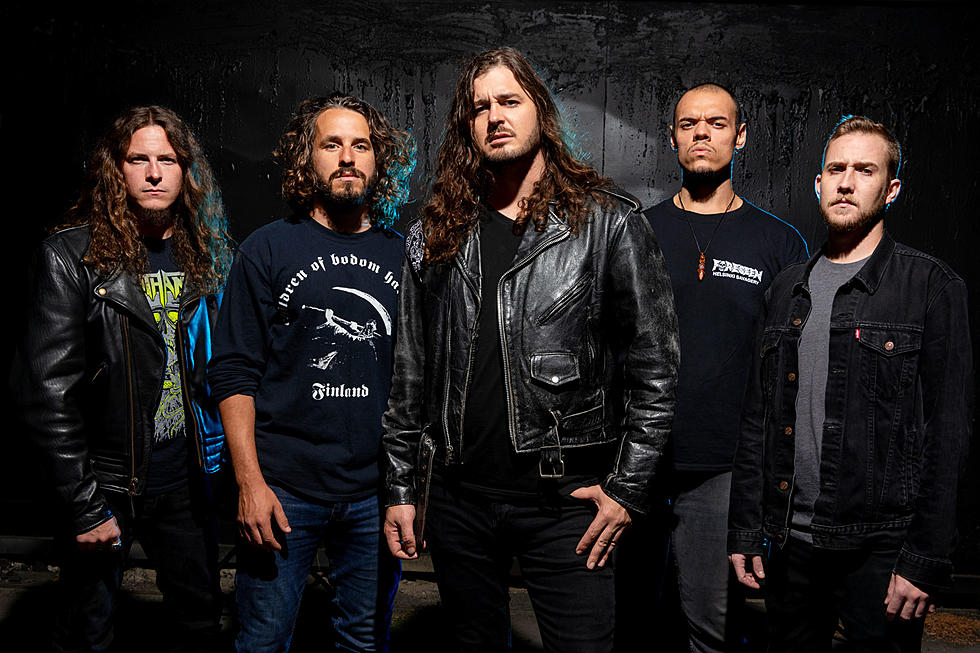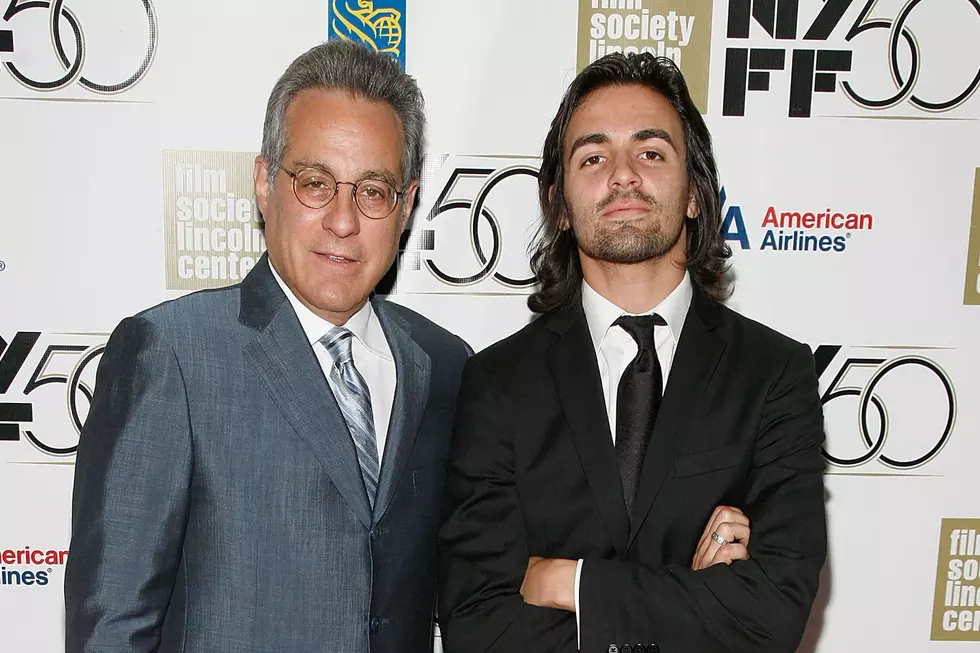
Metal’s War Obsession: An Interview With Warbringer’s History Graduate John Kevill
Warbringer frontman John Kevill is quite the history buff, which gives a certain level of authenticity to his themes of war and conflict that run rampant throughout the thrash group's music, especially on the new record, 'Weapons of Tomorrow.' Here, the singer dives into not just metal's obsession with war, but all of humankind's fascination with our inability to stop killing one another. Take it away, Mr. Kevill...
First, tell us a bit about your schooling in world history and, more specifically, times of war.
I began my studies in 2014 after Warbringer released IV: Empires Collapse and attained a bachelor’s degree at California State University Northridge in 2019, immediately before entering the studio to record Weapons of Tomorrow.
I managed to graduate with Dean’s List honors and had the really cool opportunity to actually teach a class lecture once in Prof. Sullivan’s WWII class — a class I was not enrolled in. Sullivan, who does Russian studies, saw my interest in the Soviet side of WWII, and so he was generous enough to let me do my own 90-minute lecture on Stalingrad to his class.
It was a really cool and rare opportunity for an undergrad. Most of my studies weren't warfare, however, and I went through a wide range of historical topics, but I did have an opportunity to produce a term paper on Winfield Scott’s landing and siege of Veracruz during the Mexican-American War.
My own personal reading often focuses on geopolitics, power, warfare, and great power struggles, especially in the period of 1789-1945 (French Revolution through WWII). WWI is probably the thing I know the most about — there’s this colossal sense of tragedy that looms over the whole thing, which really draws me in.
Did you become interested in history and war before or after listening to metal music with these lyrical themes?
Before. My dad was really into this stuff and I followed suit by way of model planes, tanks, and strategy war games. I learned chess when I was very young (five years old), so I’ve had this personal connection to the idea of strategy since then. I think strategy, as a concept, goes well beyond warfare. It is a wonderful kind of meta-thought that is applicable to basically every situation in life.
My parents divorced when I was very young, too, so the war / strategy interest is one of the things from my dad that did stick (I lived with my mom growing up.) He was great at explaining history, and I remember him drawing out maps of famous battles on napkins while we were eating hamburgers and such.
I remember, as well, when I was learning to read, that I brought in a book about Pearl Harbor and the teacher made me stop reading it when it talked about strafing people with machine guns and such. I said, "But it’s real! It’s history!"
Warbringer, "Glorious End"
The rejection of religion is more prevalent in the metal community. Many use religion as a means to cope with death, meanwhile metal typically mocks death, seemingly as its own form of coping mechanism. War themes in metal are often approached from a point of criticism, relenting mass death. Do you feel non-theistic beliefs fuel these views?
Well, I myself am non-theistic. I think the word "crutch" may be loaded — you could just as easily say "essential bulwark" and many would agree with that. Consider how horrifying death actually is to us mortal beings, we really need a coping mechanism.
Being an atheist is actually pretty tough sometimes, because one doesn’t have a clear answer to the questions of death and meaning. I may view the answers that religion offers as false, even delusional, but at the same time, I’m somewhat envious that people are able to live as if they have answers. I am not and the void that leaves in me goes out into some thrashing music.
When I look at mass death (and there’s no shortage of that in warfare), it makes me think of my own life and what it means to me — it’s everything. Then you multiply that by some of the staggering numbers one sees — 57,000 killed / wounded in a day for the British alone on July 1, 1916. There were 27,000 people killed in a day for the French alone on Aug.22, 1914. Stalingrad, 1942-1943, is somewhere above one million casualties.
Or consider attacks like Marye’s Heights at Fredericksburg or Pickett’s Charge at Gettysburg during the American Civil War — unmitigated slaughter. What would it be like to be in one of these events? How would one cope with it? It seems almost impossible to even have a frame of reference to actually understand this stuff, and I think that is one of the reasons I’m so drawn to it.
It becomes especially awe-inspiring in its true scope when one imagines the totality of their life, and its significance to themselves, and then imagines that same significance, multiplied by whichever number one sees on the casualty list. Truly, truly grim.
What was the first metal song you heard that dealt with war themes?
A huge number of canon classics in metal are war themed. A lot draw on classic literature and historic material and invoke it in music. I love this about metal.
Metallica's "One" is based off the novel Johnny Got His Gun. For Iron Maiden, "The Trooper" is Tennyson’s "The Charge of the Light Brigade," "Aces High" is the Battle of Britain and "Run to the Hills" is the frontier wars between U.S. Cavalry and Native Americans (with verses that alternate between the two perspectives of the warring sides), etc.
I’ll rattle off a few more: Black Sabbath's "War Pigs," Megadeth's "Holy Wars (The Punishment Due)," Metallica's "Disposable Heroes" (clearly set on the Western Front, based on the imagery), Slayer's "Chemical Warfare" and "Mandatory Suicide," Saxon's "Power and the Glory" ("The general says we’ll win the war / just sacrifice a thousand more," coming from a British band, makes me think of Haig on the Somme / Third Ypres. They get some Tennyson paraphrasing in there, too, with "Mine is not to reason why / mine is just to do or die").
Metalheads are often cast as misfits. Are war themes also euphemisms for personal battles?
They certainly can be. For people who have not been combat soldiers in their life (most of us), I think that kind of analogy is how we connect to these themes. If one hasn’t fought a literal battle, then they will likely naturally view it as a kind of metaphor. Life is full of conflict and struggle and war is basically the "macro" struggle to the individual "micro" struggles we have.
The great parallel between our own lives and the study of warfare in my view is this: Struggle is based around conflicting interests. In our work or home lives, just as in geopolitics, you see conflict when two parties have interests that collide, and it can get very ugly indeed when those conflicting interests seem impossible to reconcile and a suitable compromise cannot be reached.
The U.S. and North Korea, for example, are not going to be geopolitical allies anytime soon — they have irreconcilable world views and policy goals. Similarly, individuals can end up at loggerheads because they fundamentally want different stuff. Conflicting human interests are a somewhat similar thing at a macro or a micro level, I think.
Warbringer, "Black Hand Reaches Out"
How do you distinguish glorification from historical viewpoints? The easiest and most notable example would probably be Slayer's "Angel of Death."
First, let me state that I myself am a pacifist humanitarian. I regard warfare as a tragic facet of the human condition, which brings about unbelievable suffering. So "glorification" isn’t really my aim. I think that people put into the furnace of war often show incredible bravery and personal virtue, which deserves genuine respect, but that warfare itself is anything but glorious.
This being said, I think "embodying evil" is a valid and even important angle for art. The horrible truth is that terrible things happen. People are horrible to people. Atrocity, warfare, slavery, genocide — all very real things. One has to "put this in their pipe and smoke it," so to speak, in order to make any real assessment of the human species and the human condition.
"Angel of Death" as a piece of art basically throws the ugliness and horror of the holocaust in the listener's face. At no point do the lyrics suggest or imply that this is a glorious or positive thing — it’s unrelenting atrocity. The whip-crack delivery in the vocal, the tortured scream at the beginning, the bark of "AUSCHWITZ! THE MEANING OF PAIN!" forces the listener to envision and imagine a level of human suffering we can’t begin to understand.
I think that the ability to directly deal with the most horrible stuff is a strength of the metal genre. It’s not a celebration — it’s cathartic. Whether or not the song "Angel of Death" exists, the Holocaust is real, and every human has to deal with knowing the depths of cruelty that the human species is capable of. I think the "raging" at metal shows, which comes off as being a really good time, is basically a venting of that anger.
In our own discography, the song "Woe to the Vanquished" is something like this. It takes place in a Roman-era sack and burning of an ancient city (sort of imagining something like the Fall of Carthage here). It talks not only about the murdering of people, but also the destruction of religion, culture and way of life.
I tried to make the lyrics as blatantly cruel as possible: "After the conquest the men are enslaved, children are butchered, the women are raped." This stuff is real, and one doesn’t need to go back so far in time as Ancient Rome to find these things, either. Much of it is troublingly recent, or even currently.
Why do you think metalheads are so obsessed with themes of war?
I’d take "metalheads" out and replace it with "people."
Star Wars. Infinity War. Call of Duty. Game of Thrones. These are all some of the most popular franchises / entertainment pieces of recent times, and all are centered around war (often fantasy, and with some pretty dubious military logic, but still — conflict and fighting).
A huge swath of movies and games center around fighting or battle. There’s something deeply fascinating to people about it. I think it is perhaps the most risky and intense thing a person can do, is to fight.
It is also intrinsically linked to power, which people are also fascinated with. I think the literal sound of heavy metal just evokes a martial feeling more so than most other music. It can evoke the aggression, energy and terror, as well as the titanic grandiosity of it all — the heroism, tragedy, glory and mourning.
I think that the primal, evocative nature of the sound of metal bestows it with a natural affinity for these primal human themes.
Thanks to John Kevill for the interview. Get your copy of Warbringer's new album, 'Weapons of Tomorrow,' out April 24 on Napalm Records, right here. Follow the band on Facebook, Twitter and Instagram to stay on top of everything they're doing.
See Warbringer in 2020's Best Metal Songs (So Far)
More From Noisecreep










